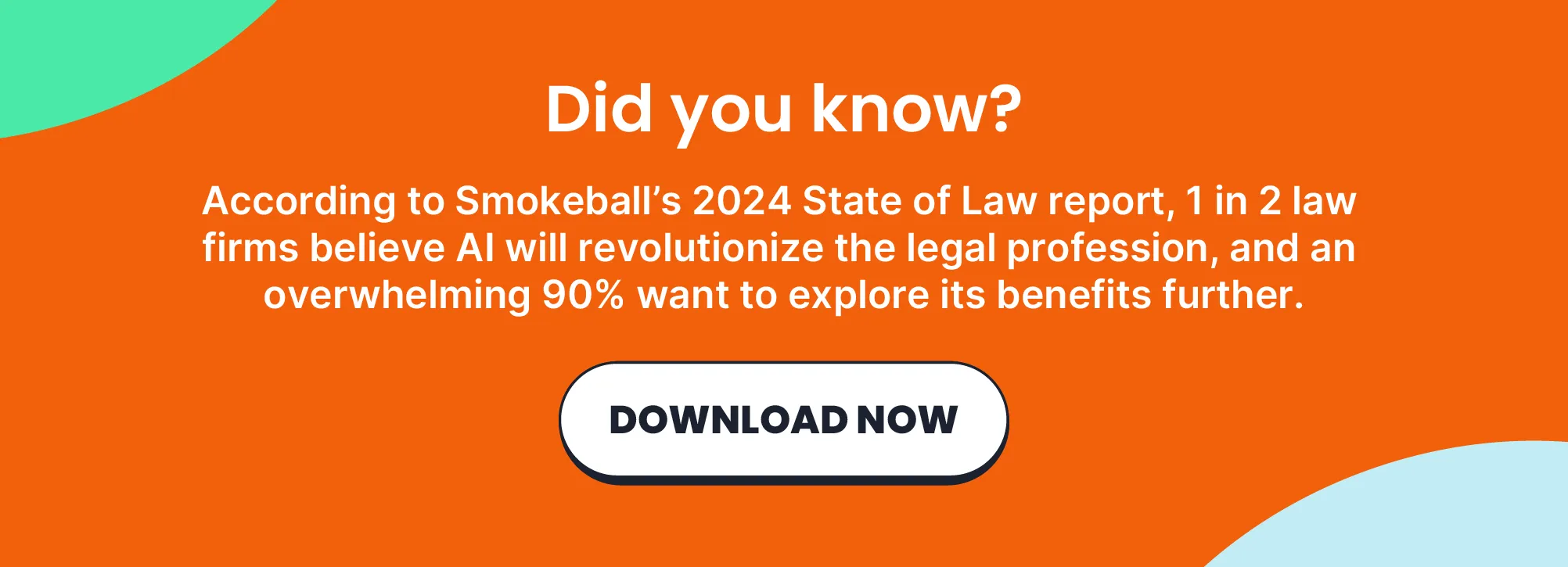A Guide to Legal AI Tools
Written by
|
November 14, 2024
Written by Smokeball
|
November 14, 2024

Written by Jordan Turk
|
November 14, 2024

Smokeball AI enhances law firms' workflows, allowing professionals to analyze large amounts of information, allowing them to focus on client relations.
Legal professionals are increasingly using technologies powered by artificial intelligence (AI) for the purpose of legal writing, employing large language models such as ChatGPT to create various legal documents and communications, including contracts, leases, and wills.
These advanced AI tools facilitate comprehensive legal research, allowing attorneys to extract valuable insights from extensive data sets. Smokeball believes that AI can enhance law firms' efficiency by allowing them to focus more on the human side of law and complete more tasks in less time — and ultimately providing greater value to their clients.
But first, a little background on all this talk about artificial intelligence.
What is artificial intelligence?
This type of cutting-edge technology allows computers and machines to greatly enhance human capabilities such as learning, understanding, problem-solving, decision-making, creativity, and autonomy. AI-enabled devices and applications can enhance performance and drive more profitable outcomes by recognizing and identifying objects. They can comprehend and interact with human language, maintaining the ability to learn from new data and experiences. These systems can provide detailed recommendations to users and professionals.
What is generative AI?
The majority of AI researchers and practitioners — along with the prevailing narratives in AI-related media — are currently — are concentrating on advancements in generative AI (GenAI). This technology is capable of producing original text, images, videos, and various other forms of content. To gain a comprehensive understanding of generative AI, it’s essential to grasp the foundational technologies that underpin these tools: machine learning (ML) and deep learning.
Machine learning vs. deep learning
Machine learning algorithms typically require human oversight to correct errors, whereas deep learning algorithms can enhance their performance through repeated exposure to data, independent of human input. While machine learning can successfully learn from smaller data sets, deep learning needs extensive data sets that may include varied and unstructured information.
Consider deep learning as an advancement of machine learning. It's a specialized technique within machine learning that organizes algorithms and computational units — referred to as neurons — into a structure known as an artificial neural network. These deep neural networks draw inspiration from the architecture of the human brain. Data traverses this network of interconnected algorithms in a non-linear manner, just like our brains interpret information everyday.
What are legal AI Tools?
Legal AI tools are software applications that leverage artificial intelligence to help lawyers and in-house legal departments perform various functions, such as contract analysis, legal research, and electronic discovery. These tools are specifically designed for the legal sector, utilizing machine learning to manage particular tasks, comprehend the intricacies of legal terminology, and interpret legal jargon to gather important information from legal documents.
The convergence of AI and law, notably in the development of in-house legal practice management software, represents a significant advancement in innovative methodologies and operational capabilities. By automating repetitive and labor-intensive tasks, these technologies enable lawyers to concentrate more on the human aspects of legal practice while accomplishing a greater number of tasks in a shorter period.

How is AI being used in the legal profession?
Legal AI tools represent advanced technological solutions that utilize artificial intelligence and machine learning to support legal practitioners in multiple parts of their business. These tools are specifically crafted to tackle the diverse challenges legal teams, including the following:
Client Experience
Technologies such as legal AI chatbots and virtual assistants can improve client interactions by delivering prompt responses to legal inquiries, facilitating appointment scheduling, and offering general legal information. This empowers lawyers to accomplish more in a shorter amount of time and with reduced effort, allowing them to enhance client experiences while minimizing costs.
Compliance Monitoring
Legal AI tools can also be used to monitor and notify businesses about regulatory changes that might impact them. Using legal AI tools to monitor these developments means that legal teams can dedicate more time to implementing the measures that meet these shifting demands. This enables businesses to be proactive in ensuring compliance instead of reactive.
Contract Review and Management
A well-known application of legal AI and law is to enhance and automate the contract management process for organizations. For instance, Smokeball’s AI-driven contract collaboration platform allows businesses to create, evaluate, and summarize contracts within seconds.The processes of contract evaluation and oversight can be optimized through legal AI applications, which facilitate the extraction of pertinent information, the identification of potential risks, and the assurance of compliance with legal requirements.
Cost Efficiency
The automation of legal processes and the capability to manage substantial volumes of data effectively can lead to cost savings and better resource allocation for both legal firms and their clients. This reduction in time and money also allows them to invest their energy into focusing on big-picture tasks like strategy and negotiation.
RELATED: Smokeball ROI Calculator
Document Examination
Artificial intelligence legal software is capable of rapidly examining extensive amounts of data for attorneys, enabling them to concentrate on more strategic and high-value activities. This increased efficiency results in greater productivity and expedited processes overall. The review and analysis of documents, including contracts and agreements, can be conducted swiftly and efficiently in large quantities, thereby conserving both time and resources.
Enhanced Due Diligence
The process of conducting due diligence frequently requires that legal professionals examine a substantial volume of documents, including contracts. Legal AI applications can expedite the due diligence process by swiftly analyzing pertinent information related to mergers, acquisitions, or business transactions, thereby uncovering potential risks and opportunities.
Legal E-discovery
Legal e-discovery refers to the practices of locating, gathering, and examining electronically stored information (ESI) within the framework of legal actions or inquiries. ESI may consist of diverse data types, including emails, text messages, social media content, financial documents, and corporate records. The e-discovery process in legal contexts can be intricate and labor-intensive. However, the use of AI-driven e-discovery tools can help automate the identification, collection, processing, and production of ESI.
Legal Research
Attorneys can leverage AI technologies to efficiently perform legal research by examining legal databases, case law, statutes, and regulations. AI-driven legal research tools empower legal practitioners to swiftly navigate and explore extensive databases, including practice areas, case law, jurisdictions, regulations, statutes, and more. Additionally, platforms that integrate with practice management software — such as Birdeye and Hona — allow users to conduct research and link it directly to pertinent case information, further enhancing efficiency.
Predictive Insights
AI streamlines the application of predictive analytics to anticipate outcomes of legal cases based on historical data, enabling attorneys to make well-informed decisions — and develop effective strategies for addressing legal challenges. For example, A legal artificial intelligence approach created by researchers from University College London, the University of Sheffield, and the University of Pennsylvania has demonstrated the capability to forecast judicial rulings of the European Court of Human Rights with an accuracy rate of 79%.

What Should You Look for in AI Tools for Lawyers?
When selecting AI tools for legal professionals, it’s important to identify applications that encompass all necessary features. For law firms, paralegals, and corporate legal departments, this task can be quite challenging.
Some of the best generative AI tools for legal practices should include the following characteristics:
- Cost-effectiveness: OpenAI offers access to ChatGPT 4.0 at a reasonable price, which means you should not incur excessive costs for fundamental AI functionalities. However, certain AI tools designed for legal practitioners may provide additional features that come with a higher price.
- Document management capabilities: The applications should facilitate the easy uploading, attaching, and sharing of various file formats, including Word documents and PDFs.
- Collaboration tools: Law firms and clients have to stay informed, which can be achieved through features that allow for collaboration and commenting on shared files.
- Access control: Given the confidential nature of most legal documents, it’s crucial to have the ability to set permissions and manage who can access the application — and the documents stored within it.
- Security: AI tools protect client data by limiting unauthorized access, reducing breaches, complying with legal standards, detecting unusual patterns, and fostering a secure culture within the firm.
- Trial and free options: As some AI tools for legal professionals can be quite expensive, it’s advisable to ensure that you can test the software before making a purchase.
Artificial Intelligence and Law Firms
Legal research platforms are increasingly integrating AI into their offerings, with Smokeball AI helping with tasks like information gathering, drafting correspondence, and matter summaries. The software streamlines workflows from lead intake to billing, enabling law firms to focus on high-value work. Founded in 2010, the company has been developing and refining AI-powered legal practice management software since 2010. It empowers law firms to run more profitable, organized firms and attract ideal clients. Learn more about Why Lawyers choose Smokeball.
What is Smokeball AI?
Acknowledged by G2 as the premier practice management software, Smokeball’s legal AI tools offer remarkable features, exemplary service, and significant results. Join over 15,000 clients worldwide who are experiencing increased productivity and profitability with our legal AI tools, including Archie, the Smokeball AI Assistant. Book a demo with an expert.
Learn more about Smokeball document management for law firms:
Book Your Free Demo
Ready to see how Smokeball client intake software helps you Run Your Best Firm? Schedule your free demo!










%20(1).webp)





